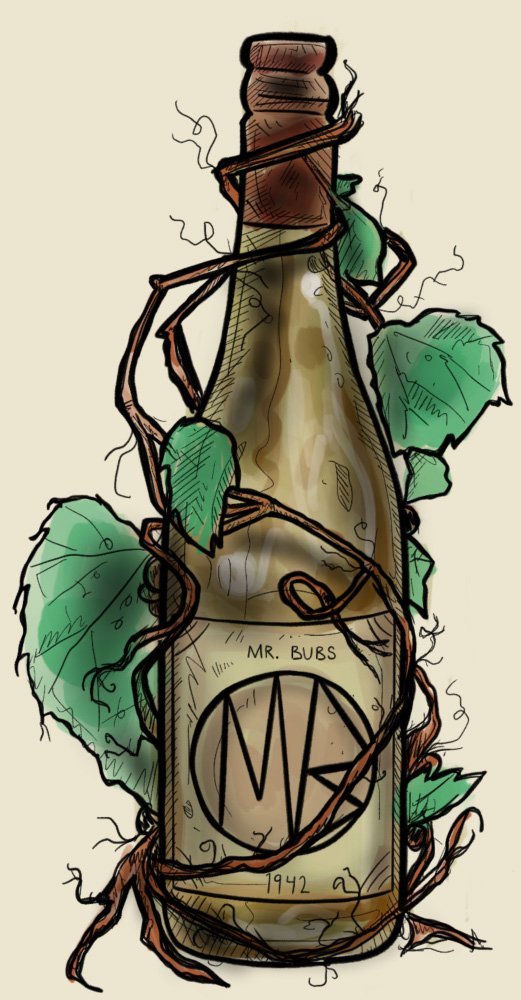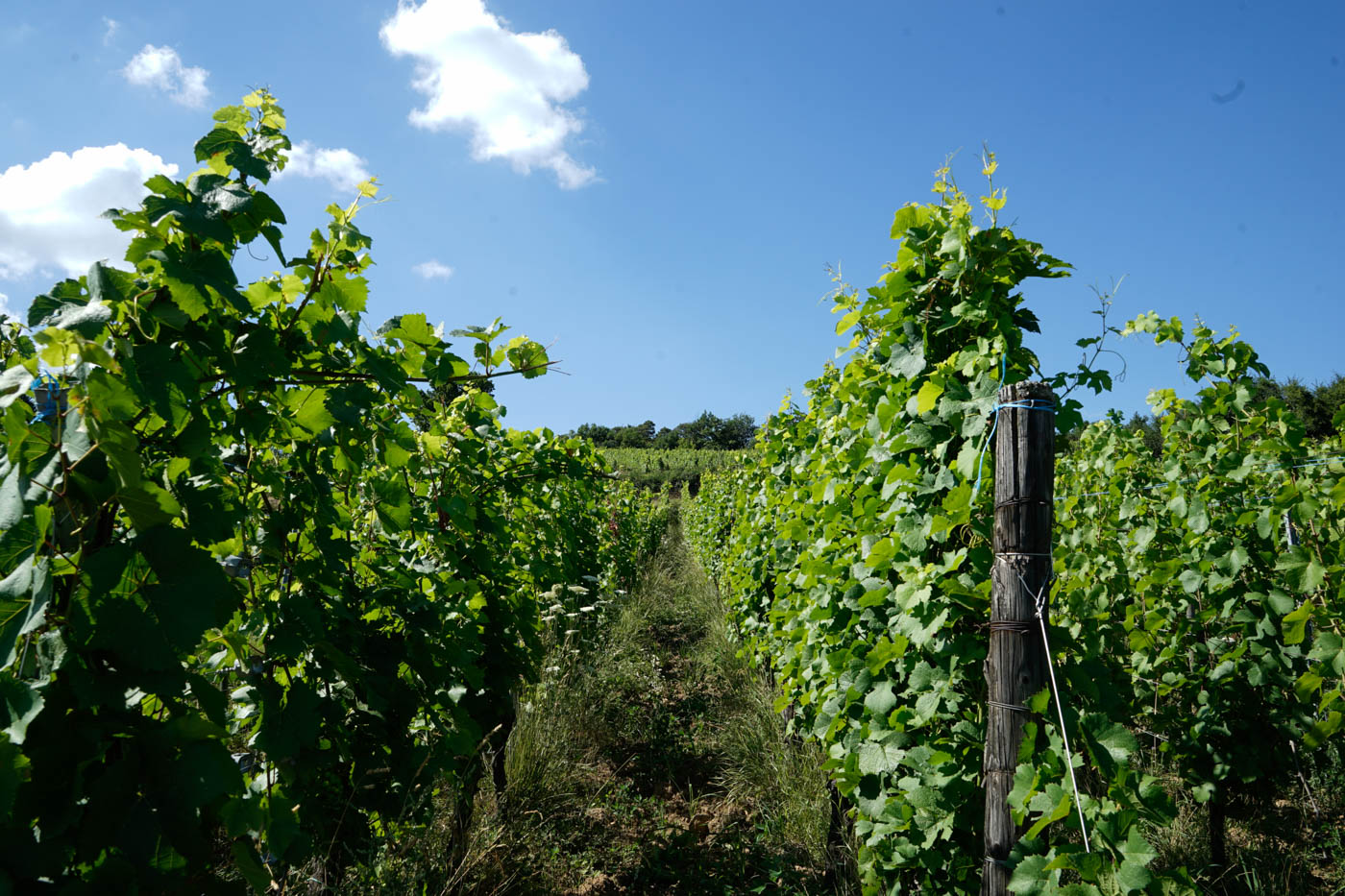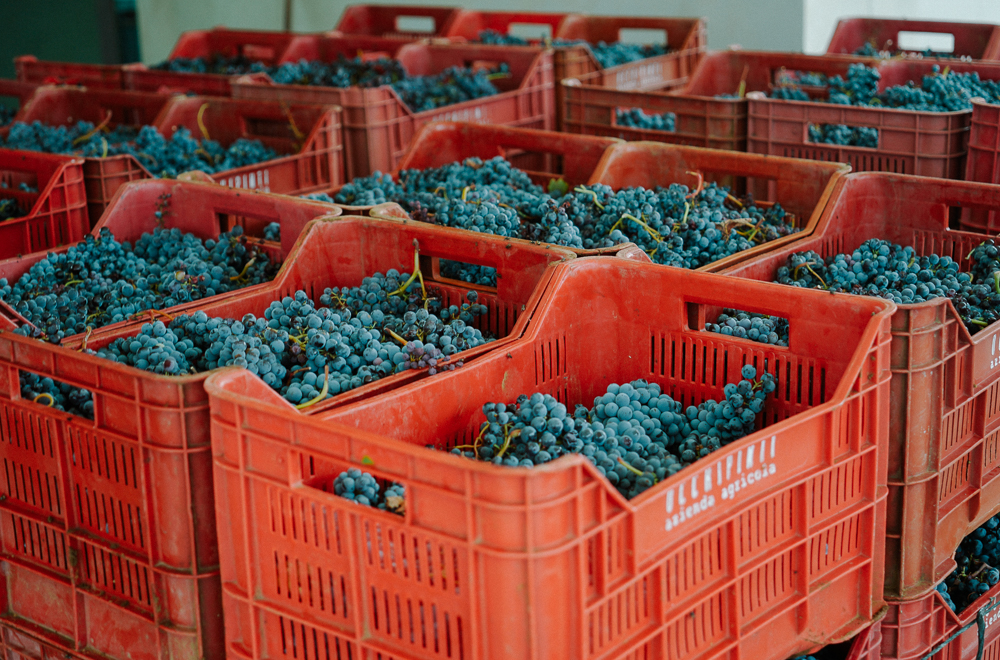Don’t Drink the Hype
A Commentary on Natural Wine, and its Commentary On Us.
Words by Ashley Ragovin
Illustration by Cesar Diaz

I tasted with a young winemaker recently and fell in love with his wines. He’s worked all over the world and learned that winemaking is subject to natural forces that supersede his own goals. He joined with some like-minded farmers to take over a wild property where old vines were growing. They work by hand, without chemicals. They farm minimally, employing complicated, labor-intensive techniques that are tedious and slow because the means are as significant as the ends. His wines are complex, expressive and balanced. They’re arresting, soulful and, by all accounts, natural.
While we tasted, he told me a story. A buyer for a very influential restaurant loved his wines too. After lauding them, the buyer asked if he used sulfur. The winemaker answered that yes, small amounts are used at bottling, to preserve stability and prevent refermentation and overgrowth of bacteria, which severely degrade the wine’s taste and drinkability.
I imagined this buyer pondering the winemaker’s honest answer. Sure, he loved the wine, but zero-zero wines (completely sulfur-free with zero intervention) were selling. The buyer says to the winemaker, who spent a year up to his knees in nature, “So then make us a version without any sulfur, can’t you?”
Let me translate that request:
Dear vintner,
I know you’ve sacrificed your yields and thus, livelihood, for the benefit of the land you work; you’ve planted for future generations, from which you’ll never reap financial benefits; I know making even a humble living selling wines is hard, and you do it without chemicals, which is infinitely harder, riskier and less reliable. But I have a brand to uphold, so I’ll need you to make some adjustments.
The winemaker could have lied, and the buyer would have bought the wine. And that happens. No one but the vintner would likely have ever known the difference. Because the sad truth is, the buyer wasn’t shopping for good wine. He was shopping for a trend.
And herein lies the problem with the “natural wine” movement. It’s been redirected by a lazy industry to appeal to our “like”-hungry, Instagrammable, click-oriented culture and 140-character attention spans for bite-size bullshit. Fads don’t require deep thought, conversation or consideration. They scratch an itch, but they pervert well-intentioned, noble aims with shortcuts and simplicity; they circumvent honesty.
So wait, what is this “natural wine” I’ve been hearing about then?
If you’re confused, it’s not your fault. Natural wine has lost its meaning. It’s become a post-truth overcorrection that’s misleading us all—buyers, winemakers and consumers. And the irony of this over complication? “It’s just common sense,” says Dani Rozman of La Onda Wines. “If you look at a vineyard not sprayed with chemicals, it’s alive. It feels the way it’s supposed to. It’s full of energy and makes more energetic, interesting wines.”
The practices championed by the natural movement simply make up how winemaking was done four hundred years ago. Winemakers are pragmatists. If they’re doing something a certain way, it’s because they believe it yields better results, not because it fits a trend. Wine made in the absence of chemicals and manipulation, with reverence for the environment, reflective of its place, is just good wine.
While most band-wagoneers can at least concede that natural wine should be made with grapes grown organically and minimal intervention, there’s no universally-accepted single definition. But there are some tricky key points to understand.
Let’s start with sulfur. Sulfur occurs in wine both naturally, as a byproduct of fermentation, and as a way to preserve freshness in wine without chemicals. When added in small doses, it does no harm to the wine; quite the opposite actually. I’ve talked to many knowledgeable, conscious winemakers around the world and most add sulfur at bottling to preserve their wine and allow for an unmuddled, clean expression—a practice that dates back to ancient Roman times.
There are also much more concerning things added to wine than sulfur: synthetic nutrients, fining agents like isinglass (fish-based glue), velcorin (potentially dangerous, undetectable chemical that prevents refermentation), acid, colorants, water, sugar—the list is long. Then you have your egg whites, animal enzymes, and commercial yeast strains. These bad boys can be found in bottles labeled “organic.” Yep, organic refers to solely how grapes are grown, not how wine is made. That means plenty of additives are permitted in organic wine. And the U.S. requirements for organic differ from their E.U. organic counterparts. There’s non-certified practicing organic, and certified organic, the latter of which permits the use of approved herbicide and pesticide treatments.
And “biodynamics?” That’s a more elaborate set of protocols that applies beyond grapes. The focus is holistic, spiritual, and ecological; the lunar cycle, cosmic universe, and total ecosystem must be considered at every step in the vineyard and the cellar. Certification is expensive (and bureaucratic), so many winemakers practice total biodynamics without getting certification—meaning they can’t indicate that on their labels. And the category “natural” has no singular meaning.

Confused? You’re not alone. Winemaking is complicated. So relying on the label natural as the single barometer to measure a wine’s merits is reminiscent of a laziness to which the wine industry has fallen victim in the past. In the 1990s, a phenomenon known as “Parkerization” struck the wine industry like a club to a baby seal. Fur coats were in demand, except by fur coats I’m referring to overtly-ripe, highly alcoholic, manipulated wines that were expensive to make and even pricier to buy.
An arbitrary scoring system based on wine critic Robert Parker’s taste preferences sent winemakers scrambling to achieve high scores. Market demand was Bigger! Fatter! More! despite the financial or environmental costs, no matter the integrity of a wine’s identity. The call was answered by any means necessary: aggressive use of chemicals in the vineyards, added sugar, commercial yeast strains, coloring agents, wood chips, thickening agents, chemicals in the wine—you name it, it was done, to yield wine that tasted like every other wine and satisfied Parker’s scale. Winemaking wasn’t dependent on soil, sun, weather, or know-how because technology could override all that; a proprietor could nip and tuck anything to generate a cosmetically desirable wine, entirely devoid of any sense of place.
The natural pushback to all that manipulation was the urge to drink something real, something uncluttered, something honest. But failing to trust the winemakers’ choices, tallying their sulfur counts and lab-testing their wines to fit an undefinable standard infuses dishonesty into wine culture. Authenticity and diversity, in both wine and life, are complex pursuits with a spectrum of right answers, not a binary playbook.
Many of the best winemakers don’t even bother with the word natural because they believe it’s been bastardized and appropriated by an agenda that’s disconnected to the actual work of making wine. “I don’t want our wine to be called natural wine,” says Mikey Giugni, who makes Scar of the Sea with his partner, Michael Brughelli, in California’s coastal valleys and canyons. “We just make real wine; that’s it.”
It seems unfair that real winemakers should have to qualify their wines to buyers or writers, when additions in commercial wines like coloring agents, water, sugar, commercial bacteria, or any of the other dozens of FDA approved wine additives, chemicals, and technological manipulations don’t have to be disclosed to consumers. “Our wine is honest wine, farmed to the absolute best quality with nothing done that isn’t absolutely necessary,” says Giugni.
Instead of asking simply if a wine is natural, we should be looking for a wine that not only tastes good, but indicates a place, good technique, knowledge of winemaking, and that distinct quality known as terroir. That word’s been slapped around and practically abandoned, maybe for its pretentious connotations (see early 2000s sommeliers swirling a decanter in your face). But it’s the only word that connotes the complete essence of: as in, this wine is of this place in time, it exists at the intersection of one geography, culture, weather, spirituality, history, soul, emotion, season and moment. It’s total singularity and the English language has no equivalent (similar to how French language has no word for entrepreneur). Given the massive homogenization of the global food market, agriculture and business, and the pervasive fear and marginalization of outsiders, terroir is the most crucial element in wine because terroir is the notion of identity, it deserves to be preserved, championed, revered.
But how do you drink honest, well-made wine without getting tangled in chemistry or lost in a mercurial and ever-changing definition of natural? Wine doesn’t sprout from the earth in a shiny glass bottle and make itself. Wine is a product that relies on human skill; it can’t exist without process and culture. It is made by a person.
Rather than obsessing over how to define natural wine and what to exclude, we should be rejecting unnatural commercial wine and wine made poorly. Instead of measuring a wine’s worth in parts per million, let’s stop buying wine with industrially-farmed fruit, synthetic pesticides, toxic chemicals, and unnecessary tampering subbed in for skill. We should demand a labeling system that indicates not just where a wine is from, what’s in it, and how the land was treated.

What is most encouraging is that there is more good wine available than ever before, more winemakers willingly doing the harder work of making honest, delicious wine. They remain above the fray, planting vines that won’t be fruitful for decades, or even centuries in some cases, long after this debate turns to dust. They’re doing work the hard way because they believe in its value, and the future, and that’s worth seeking out and drinking. It takes effort to get that information, but it’s obligatory as trade buyers, educators, writers and consumers.
So instead of rallying around a trend, I propose rallying around the experts. No, not me (but gosh jeez, thank you, I’m flattered!) and not any other agenda-toting sommelier or wine writer. I’m talking about the vintners. The men and women on the frontlines, with dirty hands and big hearts. Winemakers deserve the latitude and means to make choices they believe best reflect the land instead of being pressured by those who don’t do the vineyard work and don’t assume the risk. Wine is a farmer’s attempt to express a specific place, and connect with other people, by way of the vine. We have to support those doing that work, those who are at the mercy of what is natural at all times.
Good wine doesn’t fit neatly into a category. It doesn’t answer questions; it ignites them.
It inspires awe of nature, but also someone’s ability to harness that for pleasure and connection. The wines worth drinking are rich in emotion, struggle, and perseverance; those are very personal, intimate, and, ultimately, human endeavors.
——
Ashley Ragovin has launched and managed wine programs for some of Los Angeles’ best restaurants including Animal, Trois Mec, Osteria Mozza, Scopa Italian Roots and more. She is currently the founder of Pour This, a monthly wine club.


Our comments section is for members only.
Join today to gain exclusive access.